|
Books Should Be Free Loyal Books Free Public Domain Audiobooks & eBook Downloads |
|
|
Books Should Be Free Loyal Books Free Public Domain Audiobooks & eBook Downloads |
|
Travel Books |
|---|
Book type:
Sort by:
View by:
|
By: Mark Twain (1835-1910) | |
|---|---|
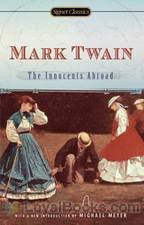 The Innocents Abroad
The Innocents Abroad
When you dive into Mark Twain’s (Samuel Clemens’) The Innocents Abroad, you have to be ready to learn more about the unadorned, ungilded reality of 19th century “touring” than you might think you want to learn. This is a tough, literary journey. It was tough for Twain and his fellow “pilgrims”, both religious and otherwise. They set out, on a June day in 1867, to visit major tourist sites in Europe and the near east, including Greece, Turkey, Lebanon, Syria, “the Holy Land”, and Egypt... | |
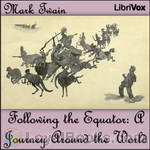 Following the Equator: A Journey Around the World
Following the Equator: A Journey Around the World
Following the Equator (American English title) or More Tramps Abroad (English title) is a non-fiction travelogue published by American author Mark Twain in 1897. Twain was practically bankrupt in 1894 due to a failed investment into a “revolutionary” typesetting machine. In an attempt to extricate himself from debt of $100,000 (equivalent of about $2 million in 2005) he undertook a tour of the British Empire in 1895, a route chosen to provide numerous opportunities for lectures in the English language... | |
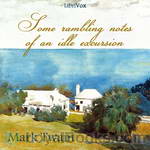 Some Rambling Notes of an Idle Excursion
Some Rambling Notes of an Idle Excursion
Written for the Atlantic magazine in 1877, this is a collection of stories about a trip Mark Twain made with some friends to Bermuda. It contains fascinating descriptions of Bermuda the island, and some of its people as well as an explanation of why Bermuda's houses are "so white". | |
By: Charles Dickens (1812-1870) | |
|---|---|
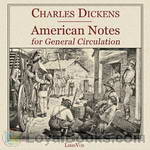 American Notes for General Circulation
American Notes for General Circulation
American Notes for General Circulation is a travelogue by Charles Dickens detailing his trip to North America from January to June, 1842. While there he acted as a critical observer of these societies almost as if returning a status report on their progress. This can be compared to the style of his Pictures from Italy written four years later, where he wrote far more like a tourist. His American journey was also an inspiration for his novel Martin Chuzzlewit. | |
 Pictures from Italy
Pictures from Italy
e: Dickens takes time off his novels to give an account of travels which he and his family undertook in France and Italy. There are vivid descriptions of the places, but also of the people and their lives. | |
By: Jules Verne (1828-1905) | |
|---|---|
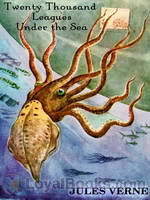 Twenty Thousand Leagues Under the Sea
Twenty Thousand Leagues Under the Sea
An early science fiction novel written by the second most translated author, French writer Jules Verne, the classic tale depicts an incredible sea expedition on board a state-of-the-art submarine. First published in 1870 and a part of the Voyages Extraordinaires series, the novel is regarded as one of the most thrilling adventure stories and one of Verne’s greatest pieces of work. Immersed in themes of exploration, avant-garde technology, and man’s insatiable desire for knowledge and scientific progression, Twenty Thousand Leagues Under the Sea has been an influence for many writers as well as an inspiration for numerous film adaptations... | |
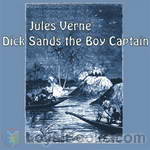 Dick Sands the Boy Captain
Dick Sands the Boy Captain
Dick Sands, a youth of fifteen, must assume command of a ship after the disappearance of its captain. Nature’s forces combined with evil doings of men lead him and his companions to many dangerous adventures on sea and in Central Africa. | |
 Celebrated Travels and Travellers, vol. 1
Celebrated Travels and Travellers, vol. 1
The famous writer of great adventure stories Jules Verne wrote also several lesser known, but good non-fiction works. "Celebrated travels and travellers" tells the story of geographical discovery in the same well written and precise manner we are used to finding in Verne’s fiction books. This book is divided into 3 volumes. This is the first volume, named the "Exploration of the World" and it covers the period in the World's history of exploration from B.C. 505 to the close of the 17th century. The second and third volumes are respectively entitled "The great navigators of the 18th century" and "The great navigators of the 19th century".Coordinated by Kristine Bekere and Kajo. | |
 Dick Sand A Captain at Fifteen
Dick Sand A Captain at Fifteen
| |
 Round the World in Eighty Days
Round the World in Eighty Days
| |
By: Robert Louis Stevenson | |
|---|---|
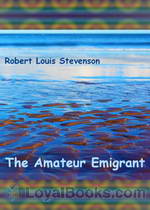 The Amateur Emigrant
The Amateur Emigrant
In July 1879, Robert Louis Stevenson left Scotland to meet his future wife in her native California. Leaving by ship from Glasgow, Scotland, he determined to travel in steerage class to see how the working classes fared. At the last minute he was convinced by friends to purchase a ticket one grade above the lowest price, for which he was later thankful after seeing the conditions in steerage, but he still lived among the ‘lower’ classes. His comments on the experience make interesting reading. His father however was so shocked at the thought of his son associating with people ‘beneath him’ that the work was not published for a number of years, | |
 Travels with a Donkey in the Cevennes
Travels with a Donkey in the Cevennes
| |
 Travels with a Donkey in the Cevennes
Travels with a Donkey in the Cevennes
A classic of travel writing, this book recounts Stevenson's adventures on an extended walk through uplands and mountains in south-western France. Humorous on his own failings as a traveller, and on his travails with Modestine the self-willed donkey, it is also an exploration of peasant life in an area marked by the violence of the wars of religion. This version includes the fragment "A mountain town in France", originally intended as the opening chapter, but often omitted and published as a separate essay. | |
 Inland Voyage
Inland Voyage
As a young man, Stevenson wished to be financially independent and began his literary career by writing travelogues. This is his first published work, written at a time when travel for pleasure was still a rarity. He and a friend traveled by canoe through France and Belgium and he relates how they were thrown in jail, mistaken for traveling salesmen and became embroiled in gypsy life. | |
 Edinburgh Picturesque Notes
Edinburgh Picturesque Notes
| |
By: Jack London | |
|---|---|
 The Cruise of the Snark
The Cruise of the Snark
The Cruise of the Snark (1913) is a memoir of Jack and Charmian London’s 1907-1909 voyage across the Pacific. His descriptions of “surf-riding”, which he dubbed a “royal sport”, helped introduce it to and popularize it with the mainland. London writes: Through the white crest of a breaker suddenly appears a dark figure, erect, a man-fish or a sea-god, on the very forward face of the crest where the top falls over and down, driving in toward shore, buried to his loins in smoking spray, caught up by the sea and flung landward, bodily, a quarter of a mile... | |
By: Rudyard Kipling (1865-1936) | |
|---|---|
 American Notes
American Notes
In American Notes, Rudyard Kipling, the Nobel Prize-winning author of the Jungle Book, visits the USA. As the travel-diary of an Anglo-Indian Imperialist visiting the USA, these American Notes offer an interesting view of America in the 1880s. Kipling affects a wide-eyed innocence, and expresses astonishment at features of American life that differ from his own, not least the freedom (and attraction) of American women. However, he scorns the political machines that made a mockery of American democracy, and while exhibiting the racist attitudes that made him controversial in the 20th century concludes “It is not good to be a negro in the land of the free and the home of the brave... | |
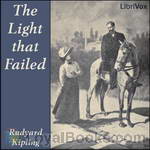 The Light that Failed
The Light that Failed
This novel, first published in 1890, follows the life of Dick Heldar, a painter. Most of the novel is set in London, but many important events throughout the story occur in Sudan or India. It was made into a 1916 film with Jose Collins and a 1939 film by Paramount starring Ronald Colman. | |
 Letters of Travel
Letters of Travel
| |
By: Daniel Defoe (1661?-1731) | |
|---|---|
 From London to Land's End and Two Letters from the "Journey through England by a Gentleman"
From London to Land's End and Two Letters from the "Journey through England by a Gentleman"
| |
 Tour through Eastern Counties of England, 1722
Tour through Eastern Counties of England, 1722
| |
By: Herman Melville (1819-1891) | |
|---|---|
 Omoo
Omoo
| |
By: G. K. Chesterton | |
|---|---|
 What I Saw in America
What I Saw in America
“Let me begin my American impressions with two impressions I had before I went to America. One was an incident and the other an idea; and when taken together they illustrate the attitude I mean. The first principle is that nobody should be ashamed of thinking a thing funny because it is foreign; the second is that he should be ashamed of thinking it wrong because it is funny.” (Gilbert Keith Chesterton) | |
By: Louisa May Alcott (1832-1888) | |
|---|---|
 Shawl-Straps: A Second Series of Aunt Jo's Scrap-Bag
Shawl-Straps: A Second Series of Aunt Jo's Scrap-Bag
| |
By: Stephen Leacock (1869-1944) | |
|---|---|
 Chronicles of Canada Volume 20 - Adventurers of the Far North
Chronicles of Canada Volume 20 - Adventurers of the Far North
This is volume 20 ofThe Chronicles of Canada series. This volume describes the explorers who braved the Canadian Arctic in search of the Northwest Passage, focusing on Samuel Hearne, Sir Alexander Mackenzie, and Sir John Franklin. | |
By: Harriet Beecher Stowe (1811-1896) | |
|---|---|
 Sunny Memories of Foreign Lands, Volume 2
Sunny Memories of Foreign Lands, Volume 2
| |
By: Henry David Thoreau (1817-1862) | |
|---|---|
 A Week on the Concord and Merrimack Rivers
A Week on the Concord and Merrimack Rivers
| |
By: Henry James (1843-1916) | |
|---|---|
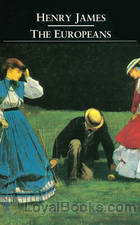 The Europeans
The Europeans
The Europeans: A sketch is a short novel by Henry James, published in 1878. It is essentially a comedy contrasting the behaviour and attitudes of two visitors from Europe with those of their relatives living in the ‘new’ world of New England. The novel first appeared as a serial in The Atlantic Monthly for July-October, 1878. James made numerous minor revisions for the first book publication. | |
 A Little Tour of France
A Little Tour of France
| |
 The Point of View
The Point of View
| |
By: Jonathan Swift (1667-1745) | |
|---|---|
 Gulliver's Travels Into Several Remote Regions of the World
Gulliver's Travels Into Several Remote Regions of the World
| |
By: Anthony Trollope (1815-1882) | |
|---|---|
 An Unprotected Female at the Pyramids
An Unprotected Female at the Pyramids
| |
 North America — Volume 1
North America — Volume 1
| |
 The Man Who Kept His Money in a Box
The Man Who Kept His Money in a Box
| |
 A Ride Across Palestine
A Ride Across Palestine
| |
 Returning Home
Returning Home
| |
By: Walt Whitman | |
|---|---|
 Specimen Days
Specimen Days
Specimen Days is essentially the great American poet Walt Whitman’s scrap book. It documents most of his life’s adventures, espeically his experience serving as a nurse during the Civil War and travelling around America. | |
By: Andre Norton (1912-2005) | |
|---|---|
 The Time Traders
The Time Traders
If it is possible to conquer space, then perhaps it is also possible to conquer time. At least that was the theory American scientists were exploring in an effort to explain the new sources of knowledge the Russians possessed. Perhaps Russian scientists had discovered how to transport themselves back in time in order to learn long-forgotten secrets of the past. That was why young Ross Murdock, above average in intelligence but a belligerently independent nonconformist, found himself on a “hush-hush” government project at a secret base in the Arctic... | |
 Key Out of Time
Key Out of Time
This is Book 4 in the Time Traders Series, In this book Ross Murdock and Arthur Ashe continue their adventures in Time and Space on the World of Hawaika. Hawaiian and Polynesian settlers help Ross and Ashe discover the way the world has changed from the data tape to present time. Helped by a girl (Karara) and her two trained dolphins (Tino-rau and Taua) | |
 The Defiant Agents
The Defiant Agents
Travis Fox and a band of fellow Apache AmerIndians have their racial memories and survival abilities enhanced by the Redax machine and are sent to the planet Topaz, one of the few worlds of the ancient star empire that the US has voyage tapes to. But the Reds have “snooped” the tapes and get there first, and have a nasty surprise waiting for any ship that does not have the proper identification. Travis and some of his fellow Apaches survive the ensuing crash landing…but can they defeat the Reds and win Topaz for themselves? This work is a sequel to both The Time Traders and Galactic Derelict... | |
By: Charles Darwin (1809-1882) | |
|---|---|
 The Voyage of the Beagle
The Voyage of the Beagle
The book, also known as Darwin’s Journal of Researches, is a vivid and exciting travel memoir as well as a detailed scientific field journal covering biology, geology, and anthropology that demonstrates Darwin’s keen powers of observation, written at a time when Western Europeans were still discovering and exploring much of the rest of the world. Although Darwin revisited some areas during the expedition, for clarity the chapters of the book are ordered by reference to places and locations rather than chronologically. With hindsight, ideas which Darwin would later develop into his theory of evolution by natural selection are hinted at in his notes and in the book . | |
By: H. Beam Piper (1904-1964) | |
|---|---|
 Flight From Tomorrow
Flight From Tomorrow
| |
By: Wilkie Collins (1824-1889) | |
|---|---|
 Rambles Beyond Railways; or, Notes in Cornwall taken A-foot
Rambles Beyond Railways; or, Notes in Cornwall taken A-foot
| |
By: James Fenimore Cooper (1789-1851) | |
|---|---|
 Recollections of Europe
Recollections of Europe
| |
By: Hugh Lofting (1886-1947) | |
|---|---|
 The Voyages of Doctor Dolittle
The Voyages of Doctor Dolittle
The delightfully eccentric Doctor Dolittle, rendered immortal on screen by the gifted Rex Harrison, has remained a firm favorite with generations of children ever since he made his debut in an earlier novel, The Story of Doctor Dolittle. In his second outing titledThe Voyages of Doctor Dolittle, the maverick physician takes on a new assistant, Tommy Stubbins. The story is structured as a first person account given by Tommy, who is now a very old man. The boy who was the son of the village cobbler first meets Doctor Dolittle when he takes a hurt squirrel to the doctor for treatment... | |
By: Washington Irving (1783-1859) | |
|---|---|
 The Sketch Book of Geoffrey Crayon, Gent.
The Sketch Book of Geoffrey Crayon, Gent.
Apart from "Rip Van Winkle" and "The Legend of Sleepy Hollow" - the pieces which made both Irving and The Sketch Book famous - other tales include "Roscoe", "The Broken Heart", "The Art of Book-making", "A Royal Poet", "The Spectre Bridegroom", "Westminster Abbey", "Little Britain", and "John Bull". His stories were highly influenced by German folktales, with "The Legend of Sleepy Hollow" being inspired by a folktale recorded by Karl Musaus. Stories range from the maudlin (such as "The Wife" and... | |
By: Ayn Rand (1905-1982) | |
|---|---|
 Anthem
Anthem
The title 'Anthem' is derived as an anthem to sense of self and self-governing thoughts. Anthem is a story of Equality 7-2521 who is a young man living in some unspecified future time and place. In this future era freedom and individual rights have been eradicated. The starring character of the novel is an inquisitive street cleaner. He lives in a society where people have lost their knowledge of individualism, to the extreme that people do not know words like 'I' or 'mine'. All the people live and work for their livelihood in collective groups, along with the people with power, namely the 'Councils'... | |
By: Margaret Sidney (1844-1924) | |
|---|---|
 Five Little Peppers Abroad
Five Little Peppers Abroad
This book is the next in the series of the Five Little Peppers, by Margaret Sidney, after Five Little Peppers and How They Grew and Five Little Peppers Midway. It continues the series where Ben, Polly, Joel, Davie, and Phronsie get to travel abroad in Europe! | |
By: Mary Roberts Rinehart (1876-1958) | |
|---|---|
 Tenting To-Night; A Chronicle Of Sport And Adventure In Glacier Park And The Cascade Mountains
Tenting To-Night; A Chronicle Of Sport And Adventure In Glacier Park And The Cascade Mountains
This is the second of two travelogues published by Mary Roberts Rinehart (1876-1958). Both deal with Glacier National Park, and this book also deals with the Cascade Mountains (The other is entitled Through Glacier Park). Rinehart wrote hundreds of short stories, poems, travelogues and articles, though she is most famous for her mystery stories. The region that became Glacier National Park was first inhabited by Native Americans and upon the arrival of European explorers, was dominated by the Blackfeet in the east and the Flathead in the western regions. | |
By: Garrett P. Serviss (1851-1929) | |
|---|---|
 Edison's Conquest of Mars
Edison's Conquest of Mars
Edison’s Conquest of Mars, by Garrett P. Serviss, is one of the many science fiction novels published in the nineteenth century. Although science fiction was not at the time thought of as a distinct literary genre, it was a very popular literary form, with almost every fiction magazine regularly publishing science fiction stories and novels. “Edison’s Conquest of Mars” was published in 1898 as an unauthorized sequel to H. G. Wells’s The War of the Worlds, but did not achieve the fame of its predecessor. The book was endorsed by Thomas Edison, the hero of the book — though not by Wells. | |
By: Eleanor Hallowell Abbott (1872-1958) | |
|---|---|
 The Indiscreet Letter
The Indiscreet Letter
Three fellow travelers on a train enter into a discussion concerning what they would call an ‘indiscreet letter.’ The discussion albeit short, produces some rather interesting revelations during the journey and at journey’s end. | |
By: Virginia Woolf (1882-1941) | |
|---|---|
 The Voyage Out
The Voyage Out
The Voyage Out is the first novel by Virginia Woolf, published in 1915 by Duckworth; and published in the U.S. in 1920 by Doran. One of Woolf's wittiest social satires.Rachel Vinrace embarks for South America on her father's ship and is launched on a course of self-discovery in a kind of modern mythical voyage. The mismatched jumble of passengers provide Woolf with an opportunity to satirize Edwardian life. The novel introduces Clarissa Dalloway, the central character of Woolf's later novel, Mrs... | |
By: John Muir | |
|---|---|
 Travels in Alaska
Travels in Alaska
In 1879 John Muir went to Alaska for the first time. Its stupendous living glaciers aroused his unbounded interest, for they enabled him to verify his theories of glacial action. Again and again he returned to this continental laboratory of landscapes. The greatest of the tide-water glaciers appropriately commemorates his name. Upon this book of Alaska travels, all but finished before his unforeseen departure, John Muir expended the last months of his life. | |
 Steep Trails
Steep Trails
A collection of Muir's previously unpublished essays, released shortly after his death. "This volume will meet, in every way, the high expectations of Muir's readers. The recital of his experiences during a stormy night on the summit of Mount Shasta will take rank among the most thrilling of his records of adventure. His observations on the dead towns of Nevada, and on the Indians gathering their harvest of pine nuts, recall a phase of Western life that has left few traces in American literature... | |
By: William Makepeace Thackeray (1811-1863) | |
|---|---|
 The Paris Sketch Book of Mr. M. A. Titmarsh
The Paris Sketch Book of Mr. M. A. Titmarsh
| |
 From Cornhill to Grand Cairo
From Cornhill to Grand Cairo
| |
 Little Travels and Roadside Sketches
Little Travels and Roadside Sketches
| |
By: Murray Leinster (1896-1975) | |
|---|---|
 Operation: Outer Space
Operation: Outer Space
Jed Cochrane is about to take off on man's first interstellar voyage. His mission: Make sure it's good television! (Introduction by Mark Nelson) | |
By: Margaret Penrose | |
|---|---|
 The Motor Girls Through New England or, Held by the Gypsies
The Motor Girls Through New England or, Held by the Gypsies
| |
By: Susanna Moodie (1803-1885) | |
|---|---|
 Roughing It in the Bush
Roughing It in the Bush
'Roughing It In the Bush' is Susanna Moodie's account of how she coped with the harshness of life in the woods of Upper Canada, as an Englishwoman homesteading abroad. Her narrative was constructed partly as a response to the glowing falsehoods European land-agents were circulating about life in the New World. Her chronicle is frank and humorous, and was a popular sensation at the time of its publication in 1852. | |
By: Publius Cornelius Tacitus | |
|---|---|
 Germania
Germania
The Germania (Latin: De Origine et situ Germanorum, literally The Origin and Situation of the Germans), written by Gaius Cornelius Tacitus around 98, is an ethnographic work on the Germanic tribes outside the Roman Empire. Germania fits squarely within the tradition established by authors from Herodotus to Julius Caesar. Tacitus himself had already written a similar essay on the lands and tribes of Britannia in his Agricola. The Germania begins with a description of the lands, laws, and customs... | |
By: Joshua Slocum (1844-1910?) | |
|---|---|
 Voyage of the Liberdade
Voyage of the Liberdade
| |
By: Laurence Sterne (1713-1768) | |
|---|---|
 A Sentimental Journey Through France and Italy
A Sentimental Journey Through France and Italy
After the bizarre textual antics of “Tristram Shandy”, this book would seem to require a literary health warning. Sure enough, it opens in mid-conversation upon a subject never explained; meanders after a fashion through a hundred pages, then fizzles out in mid-sentence – so, a plotless novel lacking a beginning, a middle or an end. Let us say: an exercise in the infinitely comic. “There is not a secret so aiding to the progress of sociality, as to get master of this short hand, and to be quick in rendering the several turns of looks and limbs with all their inflections and delineations, into plain words... | |
By: John Kendrick Bangs (1862-1922) | |
|---|---|
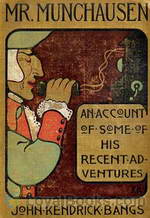 Mr Munchausen
Mr Munchausen
The author has discovered for us in this volume the present stopping place of that famous raconteur of dear comic memory, the late Hieronymous Carl Friederich, sometime Baron Munchausen, and he transmits to us some further adventures of this traveler and veracious relator of merry tales. There are about a dozen of these tales, and, judging by Mr. Bangs' recital of them, the Baron's adventures on this mundane sphere were no more exciting than those he has encountered since taking the ferry across the Styx... | |
By: Frank Richard Stockton (1834-1902) | |
|---|---|
 A Jolly Fellowship
A Jolly Fellowship
| |
 Round-about Rambles
Round-about Rambles
ROUND-ABOUT RAMBLES, In Lands of FACT AND FANCYBY FRANK R STOCKTONPREFACECome along, boys and girls! We are off on our rambles. But please do not ask me where we are going. It would delay us very much if I should postpone our start until I had drawn you a map of the route, with all the stopping-places set down. We have far to go, and a great many things to see, and it may be that some of you will be very tired before we get through. If so, I shall be sorry; but it will be a comfort to think that none of us need go any farther than we choose... | |
By: Henry Van Dyke (1852-1933) | |
|---|---|
 Out-of-Doors in the Holy Land Impressions of Travel in Body and Spirit
Out-of-Doors in the Holy Land Impressions of Travel in Body and Spirit
| |
By: Mary Wollstonecraft (1759-1797) | |
|---|---|
 Letters Written During a Short Residence in Sweden, Norway and Denmark
Letters Written During a Short Residence in Sweden, Norway and Denmark
Published in 1796, Letters Written During a Short Residence in Sweden, Norway, and Denmark is a personal travel narrative by the eighteenth-century British feminist writer Mary Wollstonecraft. The twenty-five letters cover a wide range of topics, from sociological reflections on Scandinavia and its peoples to philosophical questions regarding identity. Published by Wollstonecraft's career-long publisher, Joseph Johnson, it was the last work issued during her lifetime. Wollstonecraft undertook her tour of Sweden, Norway, and Denmark in order to retrieve a stolen treasure ship for her lover, Gilbert Imlay... | |
By: Robert Smythe Hichens (1864-1950) | |
|---|---|
 The Spell of Egypt
The Spell of Egypt
The author, a British journalist and novelist, is interested in the feel of the places he visits. He describes at length a visit he has made to Egypt, with emphasis on the emotional response the places generate. | |
 The Mission Of Mr. Eustace Greyne 1905
The Mission Of Mr. Eustace Greyne 1905
| |
By: Sarah Orne Jewett | |
|---|---|
 Deephaven
Deephaven
Sarah Orne Jewett is best known for her clean and clear descriptive powers that at once elevate common-place daily events to something remarkable, and lend dignity and grace to the most humble and homely human character. In Deephaven, go with her on vacation to an unforgettable seaside village where time runs slower and small pleasures are intensified. Much space is given to outdoor rambles and sights and events of daily living that draw you into another era. Jewett’s loving and gentle descriptions of the people and life of Deephaven will make you sorry when the book is over, and long to be able to find that village for yourself. | |
By: George Alfred Henty (1832-1902) | |
|---|---|
 On the Irrawaddy, A Story of the First Burmese War(1897)
On the Irrawaddy, A Story of the First Burmese War(1897)
With the exception of the terrible retreat from Afghanistan, none of England's many little wars have been so fatal--in proportion to the number of those engaged--as our first expedition to Burma. It was undertaken without any due comprehension of the difficulties to be encountered, from the effects of climate and the deficiency of transport; the power, and still more the obstinacy and arrogance of the court of Ava were altogether underrated; and it was considered that our possession of her ports would assuredly bring the enemy, who had wantonly forced the struggle upon us, to submission... | |
By: Charles Norris Williamson (1859-1920) | |
|---|---|
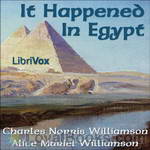 It Happened In Egypt
It Happened In Egypt
Lord Ernest Borrow and Captain Anthony Fenton think they know a secret – a secret that could make them both rich. En route, they are sidetracked by Sir Marcus Antonius Lark, a woman who thinks she’s Cleopatra reincarnate, a Gilded Rose of an American Heiress, and Mrs. Jones, a mysterious Irish woman with a past. Will they find the secret? Or will the trip up the Nile on the Enchantress Isis net them another discovery altogether? | |
By: George Manville Fenn (1831-1909) | |
|---|---|
 Bunyip Land
Bunyip Land
Joe Carstairs is a boy on a farm in Australia. His father is a keen naturalist who, some years before had set off for New Guinea in search of specimens, and never been heard of again. Joe is old enough to mount a search expedition, and takes with him a local doctor and an aboriginal worker on his farm. They find themselves joined by a stowaway, Jimmy, whose father is a squatter (farmer) nearby, together with his dog, Gyp.This team sets off, arrive in New Guinea, hire some more porters, and travel guided by some sixth sense straight to where Mr... | |
 The Adventures of Don Lavington Nolens Volens
The Adventures of Don Lavington Nolens Volens
| |
 Yussuf the Guide The Mountain Bandits; Strange Adventure in Asia Minor
Yussuf the Guide The Mountain Bandits; Strange Adventure in Asia Minor
| |
 Dead Man's Land Being the Voyage to Zimbambangwe of certain and uncertain blacks and whites
Dead Man's Land Being the Voyage to Zimbambangwe of certain and uncertain blacks and whites
| |
 Nic Revel A White Slave's Adventures in Alligator Land
Nic Revel A White Slave's Adventures in Alligator Land
| |
 Cutlass and Cudgel
Cutlass and Cudgel
Based around the crew of cutter HMS White Hawk, this is a tale of smuggling in the early 19th century off the coast of Wessex. The midshipman of the cutter is taken hostage by the smugglers and is befriended by a farm-boy, son of one of the smugglers. His friendship is rudely rebuffed, the midshipman eventually escapes and the farm-boy gets his long-held dream of becoming a seaman on an Excise vessel. | |
 The Ocean Cat's Paw The Story of a Strange Cruise
The Ocean Cat's Paw The Story of a Strange Cruise
| |
 Nat the Naturalist A Boy's Adventures in the Eastern Seas
Nat the Naturalist A Boy's Adventures in the Eastern Seas
| |
 Crown and Sceptre A West Country Story
Crown and Sceptre A West Country Story
| |
 The Crystal Hunters A Boy's Adventures in the Higher Alps
The Crystal Hunters A Boy's Adventures in the Higher Alps
| |
 In the King's Name The Cruise of the "Kestrel"
In the King's Name The Cruise of the "Kestrel"
| |
 First in the Field A Story of New South Wales
First in the Field A Story of New South Wales
| |
 Mass' George A Boy's Adventures in the Old Savannah
Mass' George A Boy's Adventures in the Old Savannah
| |
 The Rajah of Dah
The Rajah of Dah
| |
 Syd Belton The Boy who would not go to Sea
Syd Belton The Boy who would not go to Sea
| |
 Jack at Sea All Work and no Play made him a Dull Boy
Jack at Sea All Work and no Play made him a Dull Boy
| |
By: Philip K. Dick (1928-1982) | |
|---|---|
 The Skull
The Skull
| |
By: H. G. Wells (1866-1946) | |
|---|---|
 When the Sleeper Wakes
When the Sleeper Wakes
| |